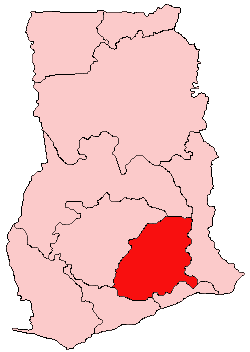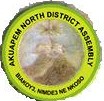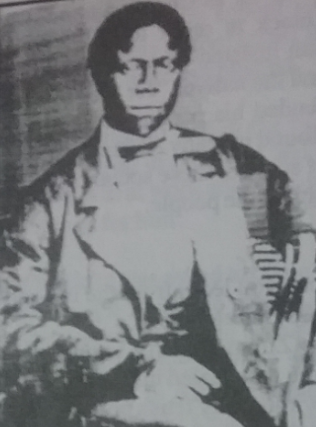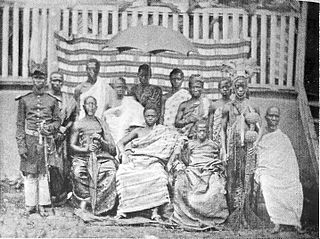This is a list of rulers and office-holders of Ghana.
The Ashanti–Akim–Akwapim War, also known as the Ashanti Invasion of the Gold Coast, was the expansion of West African Empire of Ashanti against the alliance of Akyem and Akuapem tribes from 1814 until 1816 for access to the coast. This battle was not a direct war on Akyem states, which were never subdued by any power, but a war to get access to the coasts in which the Akyem along with Akuapem forces allied for.
Akan is a group of several closely related languages within the wider Central Tano languages. These languages are the principal native languages of the Akan people of Ghana, spoken over much of the southern half of Ghana. About 80% of Ghana's population can speak an Akan language as a first or second language, and about 44% of Ghanaians are native speakers. There are populations of polyglots in Ghana who speak an Akan language as a third language. They are also spoken in parts of Côte d'Ivoire.
The Akan people are a Kwa group living primarily in present-day Ghana and in parts of Ivory Coast and Togo in West Africa. The Akan speak dialects within the Central Tano branch of the Potou–Tano subfamily of the Niger–Congo family. Subgroups of the Akan people include: the Agona, Akuapem, Akwamu, Akyem, Anyi, Ashanti, Baoulé, Bono, Chakosi, Fante, Kwahu, Sefwi, Wassa, Ahanta, and Nzema, among others. The Akan subgroups all have cultural attributes in common; most notably the tracing of matrilineal descent in the inheritance of property, and for succession to high political office.

Kwahu is an area and group of people that live in Ghana and are part of the Twi-speaking Akan group. The region has been dubbed Asaase Aban, or the Natural Fortress, given its position as the highest habitable elevation in the country. Kwahu lies in the Eastern Region of Ghana, on the west shore of Lake Volta. The Kwahus share the Eastern Region with the Akyem and Akuapem, as well as the Adangbe-Krobos. Among Kwahu lands, a significant migrant population works as traders, farm-hands, fisherfolk, and caretakers in the fertile waterfront 'melting pot' of Afram plains. These migrants are mostly from the Northern and Volta Regions, as well as, some indigenous Guans from the bordering Oti and Brong-Ahafo regions live in the Afram Plains area. Kwahus are traditionally known to be wealthy traders, owning a significant number of businesses and industries in Ghana.

Ghana is a multilingual country in which about eighty languages are spoken. Of these, English, which was inherited from the colonial era, is the official language and lingua franca. Of the languages indigenous to Ghana, Akan is the most widely spoken in the south. Dagbani is most widely spoken in the north.
Articles related to Ghana include:

The Akyem are an Akan people. The term Akyem is used to describe a group of four states: Asante Akyem, Akyem Abuakwa, Akyem Kotoku and Akyem Bosome. These nations are located primarily in the eastern region in south Ghana. The term is also used to describe the general area where the Akyem ethnic group clusters. The Akyem ethnic group make up between 3-4 percent of Ghana's population depending on how one defines the group and are very prominent in all aspects of Ghanaian life. The Akyem are a matrilineal people. The history of this ethnic group is that of brave warriors who managed to create a thriving often influential and relatively independent state within modern-day Ghana. When one talks of Ghanaian history, there is often mention of The Big Six. These were six individuals who played a big role in the independence of Ghana. Of the big six, people of Akyem descent made up the majority.
Akyem Kotoku describes a traditional geo-political entity in Eastern Ghana.
Akwamu was a state set up by the Akwamu people in present-day Ghana. After migrating from Bono state, the Akan founders of Akwamu settled in Twifo-Heman. The Akwamu led an expansionist empire in the 17th and 18th centuries. At the peak of their empire, Akwamu extended 400 kilometres (250 mi) along the coast from Ouidah, Benin in the East to Winneba, Ghana in the West.

Akropong is a town in South Ghana and is the capital of the Akuapim North District, a district in the Eastern Region of South Ghana. This town is known for producing snails and palm oil. Akropong has a 2013 settlement population of 13,785 people.
In several Akan nations of Ghana, the Omanhene is the title of the supreme traditional ruler ('king') in a region or a larger town. The omanhene is the central figure and institution of the nation. Officially, he has no function in the current Ghanaian political setup, but, has enormous influence on the people that constitute it. Today 'Hene' can be found in titles of other rulers in Ghanaian nations. For example, the chief of the Dagomba in the north of Ghana is known as the 'Dagombahene'.
The Akuapem, one of the main ethnic groups of the Akan people, reside mostly to the south of the Eastern Region of Ghana. They are indigenous, consisting of both patriarchal Volta-Comoe-speaking Guans and matriarchal Kwa-speaking Akans.

Twi is a variety of the Akan language spoken in southern and central Ghana by several million people, mainly of the Akan people, the largest of the seventeen major ethnic groups in Ghana. Twi has about 4.4 million speakers.
Akuapem, also known as Akuapim, Akwapem Twi, and Akwapi, is one of the principal members of the Akan dialect continuum, along with Bono and Asante, with which it is collectively known as Twi, and Fante, with which it is mutually intelligible. There are 626,000 speakers of Akuapem, mainly concentrated in Ghana and southeastern Cote D'Ivoire. It is the historical literary and prestige dialect of Akan, having been chosen as the basis of the Akan translation of the Bible.

Johann Gottlieb Christaller was a German missionary, clergyman, ethnolinguist, translator and philologist who served with the Basel Mission. He was devoted to the study of the Twi language in what was then the Gold Coast, now Ghana. He was instrumental, together with African colleagues, Akan linguists, David Asante, Theophilus Opoku, Jonathan Palmer Bekoe, and Paul Keteku in the translation of the Bible into the Akuapem dialect of Twi. Christaller was also the first editor of the Christian Messenger, the official news publication of the Basel Mission, serving from 1883 to 1895. He is recognised in some circles as the "founder of scientific linguistic research in West Africa".

The Christ Presbyterian Church, formerly known as the Basel Mission Church, Akropong, is a historic Protestant church located in Akropong–Akuapem, Ghana. It is the first Presbyterian Church to be established in Ghana. It was founded in 1835 by Andreas Riis, a Danish minister and missionary of the Basel Mission who was the only congregant at the time. After years of dormancy, the church began to flourish after the arrival of the Moravian missionaries from the West Indies in 1843. The Basel missionary, Johann Georg Widmann was appointed the minister-in-charge of the Akropong church in 1845. The Jamaican missionary, John Hall, who had served as an elder in his home church in Irwin Hill, Montego Bay, became the first Presbyter of the church while Alexander Worthy Clerk became the first Deacon. Liturgical services are conducted in English and the Twi language.

David Asante was a philologist, linguist, translator and the first Akan native missionary of the Basel Evangelical Missionary Society. He was the second African to be educated in Europe by the Basel Mission after the Americo-Liberian pastor, George Peter Thompson. Asante worked closely with the German missionary and philologist, Johann Gottlieb Christaller and fellow native linguists, Theophilus Opoku, Jonathan Palmer Bekoe, and Paul Staudt Keteku in the translation of the Bible into the Twi language.

Nana Amoako Atta I,, was the paramount chief of Akyem Abuakwa in nineteenth century southern Ghana. Locally, his position is known as the Okyehene or Omanhene. He ruled the traditional kingdom from July 1866 to 1880 and from 1885 to 1887. After the Sagrenti War of 1874, the British declared Akyem Abuakwa a colonial possession, legally called a ‘protectorate’, as part of the Gold Coast. This development led to a clash between the old traditional Akan culture and the imposition of the new Western Christian political order.